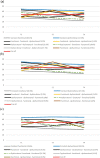Individual courses and determinants of fear of cancer recurrence in long-term breast cancer survivors with and without recurrence
- PMID: 34137933
- PMCID: PMC8549971
- DOI: 10.1007/s00520-021-06329-z
Individual courses and determinants of fear of cancer recurrence in long-term breast cancer survivors with and without recurrence
Abstract
Objective: This study investigated the prevalence, individual courses, and determinants of fear of cancer recurrence (FoR) in long-term breast cancer survivors (BCSs) with and without recurrence.
Methods: A total of 184 breast cancer survivors were surveyed at four measurement time points: during hospitalization (T1), 10 weeks (T2), 40 weeks (T3), and 5-6 years (T4) after hospital discharge. Descriptive statistics, chi-square tests, and logistic regression were performed.
Results: Respondents were females and 57 years old, on average. At T1, T3, and T4, 54.8%, 31.6%, and 29.7% of BCSs, respectively, were classified as having dysfunctional levels of FoR. Dysfunctional FoR decreased from T1 to T3 (χ2(1) = 17.11, p = 0.000; N = 163) and remained stable afterwards. Eight subgroups of individual courses of FoR over time could be described: (1) constant functional FoR; (2) constant dysfunctional FoR; (3) improving from dysfunctional to functional FoR from T1 to T3; (4) improving from dysfunctional to functional FoR from T3 to T4; (5) worsening from functional to dysfunctional FoR from T1 to T3; (6) worsening from functional to dysfunctional FoR from T3 to T4; (7) dysfunctional FoR at T1 and T4, and functional FoR in between; and (8) functional FoR at T1 and T4, and dysfunctional FoR in between. Logistic regression analysis revealed that being divorced/widowed, showing high levels of fatigue, being treated by chemotherapy, and having low confidence in treatment were associated with dysfunctional FoR 5 to 6 years after diagnosis (Nagelkerkes' Pseudo-R2 = 0.648).
Conclusions: The findings reveal that FoR is a significant issue in long-term BCSs and has the potential to become a persistent psychological strain. We emphasize the need for increased awareness of FoR among BCSs and the need for support programs.
Keywords: Anxiety; Breast cancer; Fear of cancer recurrence; Oncology; Relapse; Survivorship.
© 2021. The Author(s).
Conflict of interest statement
Clara Breidenbach and Christoph Kowalski are employees of the German Cancer Society.
Figures



References
-
- Götze H, Taubenheim S, Dietz A, Lordick F, Mehnert A. Comorbid conditions and health-related quality of life in long-term cancer survivors-associations with demographic and medical characteristics. Journal of cancer survivorship research and practice. 2018;12(5):712–720. doi: 10.1007/s11764-018-0708-6. - DOI - PubMed
-
- van Leeuwen M, Husson O, Alberti P, Arraras JI, Chinot OL, Costantini A, et al. Understanding the quality of life (QOL) issues in survivors of cancer: towards the development of an EORTC QOL cancer survivorship questionnaire. Health Qual Life Outcomes. 2018;16(1):114. doi: 10.1186/s12955-018-0920-0. - DOI - PMC - PubMed
MeSH terms
Grants and funding
LinkOut - more resources
Full Text Sources
Medical

